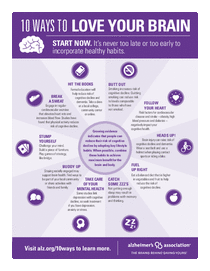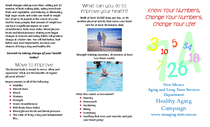Healthy Aging

Healthy Aging is the development and maintenance of optimal mental, social and physical well-being and function in older adults. This is most likely to be achieved when communities are safe, promote health and well-being, and use health services and community programs to prevent or minimize disease.
The New Mexico Department of Health wants every adult to consider their health and well-being of both their mind and their body. Look for our “10 Ways to Love Your Brain” campaign around New Mexico and read more on the Ten Ways to Love Your Brain web page.
New Mexico Aging and Long-Term Services
The New Mexico Aging and Long-Term Services Department (ALTSD) provides an array of services and supports that promote healthy and active lifestyles to older adults.
Area Agency on Aging
An “aging network” of contract providers receiving state and federal Older American Act funds, primarily through New Mexico’s Area Agencies on Aging provide services throughout the state. Visit the Area Agency on Aging page to find your local Area Agency on Aging (AAA).
The AAAs and their contract providers support several evidence-based, community programs, such as EnhanceFitness®, that provide health benefits and promote disease and injury prevention. Visit the Healthy Aging & Prevention page for a list of programs.
Healthy Aging Campaign

The ALTSD also supports the Healthy Aging Campaign - “Know Your Numbers, Change Your Numbers, Change Your Life”. This campaign was created by the late NMDOH Secretary Retta Ward during her tenure as the ALTSD Secretary. She believed it was never too late to make changes that can improve your health.
Take a look at the Healthy Aging Campaign Brochure to learn more!
Caregiver Supports and Services

A variety of supports and services may be of assistance to caregivers. Putting the pieces together can be a daunting task. ALTSD Aging & Disability Resource Center staff can help caregivers gather information and assess needs, make plans and find support.
At 1-800-432-2080 a resource specialist can direct caregivers to appropriate resources. You may also visit the Caregivers Information page to get started.
New Mexico Senior Olympics

The National Senior Games Association has just announced that the National Senior Olympic Games 2019 will be held in Albuquerque!
Savvy Caregiver Program

Brain Health Presentation Toolkit

Designed for use at senior centers and in other community settings, materials are written in plain language and explain what people can do to help keep their brains functioning best.
Healthy Aging Program

Advance Care Planning
It is important to make an advance care plan for yourself just in case there comes a day when you are no longer able to speak for yourself or make your own decisions. This is known as advance care planning. This ensures that your wishes are consistent with the health care treatment you may receive. Advance care planning not only provides your health care team with information on your health care preferences, but it also reduces any stress, confusion, or disagreement among family members trying to do what they think is right for you. Here are some tips when developing an advance care plan.
Have conversations with family members and loved ones about what you want.
Document your preferences with an advance directive or a power of attorney for health care. This individual should be someone you trust and someone who will honor your wishes.
Make sure that copies are provided to your health care provider, your hospital, and others you think should have the information.
Sample Discussion Outline
- Discuss the type of care you want.
- Where care happens?
- Home
- Assisted Living Facility
- Nursing Home
- Hospital
- Who provides care?
- Family
- Palliative or comfort care team?
- Home Care Agency
- Hospice
- Nursing Home
- Choosing or refusing?
- Tests
- Procedures
- Medicines
- Life-Sustaining Treatment
- Who can make care decisions for you when you cannot?
Advance Care Resources
Please visit the following resources to learn more about advance care planning.
- Speak Up — Advance Care Planning is a process of thinking about and sharing your wishes for future health and personal care. It can help you tell others what would be important if you were ill and unable to communicate.
- Advance Geriatric Care Planning — Advance Care Planning is a process of clarifying your values and health care choices for use at a future time if you are no longer able to make decisions for yourself.
- Give Peace of Mind Through Advance Care Planning — Advance care planning can be a gift you give yourself and your family. It is about doing what you can to ensure that your wishes and preferences are consistent with the health care treatment you might receive if you were unable to speak for yourself or make your own decisions.
- Eldercare Locator Resources — This web page provides fact sheets, publications, links and other useful information for older adults, caregivers, and professionals.
Learn More
Check out these additional resources from the Alzheimer’s Association featuring lifestyle habits that you can adopt to maintain or potentially improve your health as you age.
- Brain Health Information — These habits, spanning four categories — physical health and exercise, diet and nutrition, cognitive activity, and social engagement — can help keep your body and brain healthy and potentially reduce your risk of cognitive decline.
- Ten Ways to Love Your Brain — Growing evidence indicates that people can reduce their risk of cognitive decline by adopting key lifestyle habits. When possible, combine these habits to achieve maximum benefit for the brain and body. Start now. It’s never too late or too early to incorporate healthy habits.
Recent Activity
Publications
Latest
- Ten Ways to Love Your Brain Infographic (Marketing)
- Healthy Aging Campaign Brochure (Marketing)

